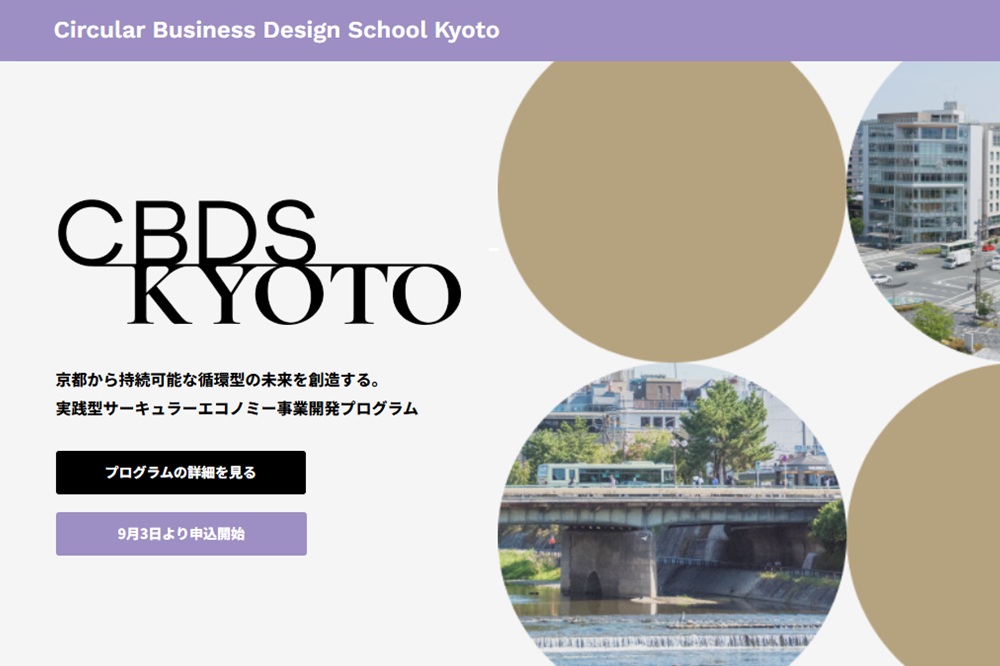
Circular economy frontlines: Exploring business models for sustainable value creation and Kyoto’s potential
- On Oct 27, 2025
- Amita Holdings, Circular Business Design School Kyoto, circular city, circular design, Circular Economy, COS KYOTO, Cultural Capital, Edonomy, Kyoto, sustainability
In recent years, the world has been shifting from a linear economy of mass production, consumption, and disposal to a circular economy that sustainably and efficiently utilizes resources to create added value. The Japanese government has positioned the realization of a circular economy as a national strategy and is accelerating its efforts.
Kyoto City has steadily advanced toward building a sustainable, circular society through collaboration with citizens and businesses. Building on its strengths in history, industry, and culture, the city has now launched new initiatives aimed at transitioning to a circular economy that pursues both economic growth and environmental and community regeneration.
To support this transition, Harch has launched the Circular Business Design School Kyoto, a learning program for local businesses focused on the circular economy, starting in October 2025.

Circular Business Design School Kyoto
The kickoff event, titled “Circular Economy Frontlines: Business Models for Sustainable Value Creation and Kyoto’s Potential,” provided a comprehensive overview of global and domestic trends and case studies related to the circular economy. It explored how to achieve sustainable value creation through industrial transformation and the utilization of cultural capital.
Guest speakers included two experts leading the theory and practice of circular economy and circular design:
Takahide Suetsugu, President and CIOO of Amita Holdings Co., Ltd., who has redefined waste and by-products as resources and implemented circular models connecting industry and society.
Isao Kitabayashi, CEO of COS KYOTO Co., Ltd. and researcher of EDONOMY®, who explores the implementation of circular and high-value systems derived from the wisdom of Kyoto’s local industries and cultural heritage.
In the first half of the event, speakers shared insights from their respective business practices, followed by a panel discussion on “Value Creation through Circular Business.” The discussion approached Kyoto’s potential from three perspectives: global trends, industry, and cultural capital.
Rather than treating the circular economy simply as a system of resource circulation, the event explored how it can be implemented in society as a source of sustainable value creation. By combining accelerating global trends, practical industrial models, and Kyoto’s rich cultural and lifestyle heritage, the discussion examined what kinds of designs, businesses, and lifestyles could emerge.
How can we extend the circular economy into the future? Together with researchers and practitioners, let us envision from Kyoto the pathways to realize it.
About Circular Business Design School Kyoto
Kyoto has assets cultivated over 1,200 years, such as the spirit of “shimatsu no kokoro” (frugality), circular ways of living, and craftsmanship traditions that continue to shine across generations.
To create the circular future now demanded by global challenges like climate change and biodiversity loss, it is essential to harness this wisdom and apply it to the present with creativity.
Harch has launched the Circular Business Design School Kyoto in October 2025, a learning program that combines Kyoto’s heritage of circular wisdom with cutting-edge insights in circular economy to co-create the desired future.
Decode Culture, Design Future: Unravel wisdom and design innovation. Together from Kyoto, let us envision a circular future that extends beyond tradition.
Program details
“Circular Economy Frontlines: Business Models for Sustainable Value Creation and Kyoto’s Potential” (in Japanese)
[Reference] Circular Business Design School Kyoto



![[IDEAS FOR GOOD] Event Report | Screening of the film The Repair Cafe at FixFest in London](https://harch.jp/wp-content/uploads/2025/09/Repair-Cafe_London1_202509-min-300x200.jpg)
![[Circular Yokohama] Event Report | Sustainable Micro-tourism: A one-day tour of sustainability initiatives in Yokohama](https://harch.jp/wp-content/uploads/2025/08/yokohama-sustainable-microtourism-202508-300x200.jpeg)
![[Kyoto City × Harch] Circular Business Design School Kyoto to launch a learning program for local businesses on transitioning to a circular economy](https://harch.jp/wp-content/uploads/2025/09/Circular-Business-Design-School-Kyoto-300x200.jpg)
